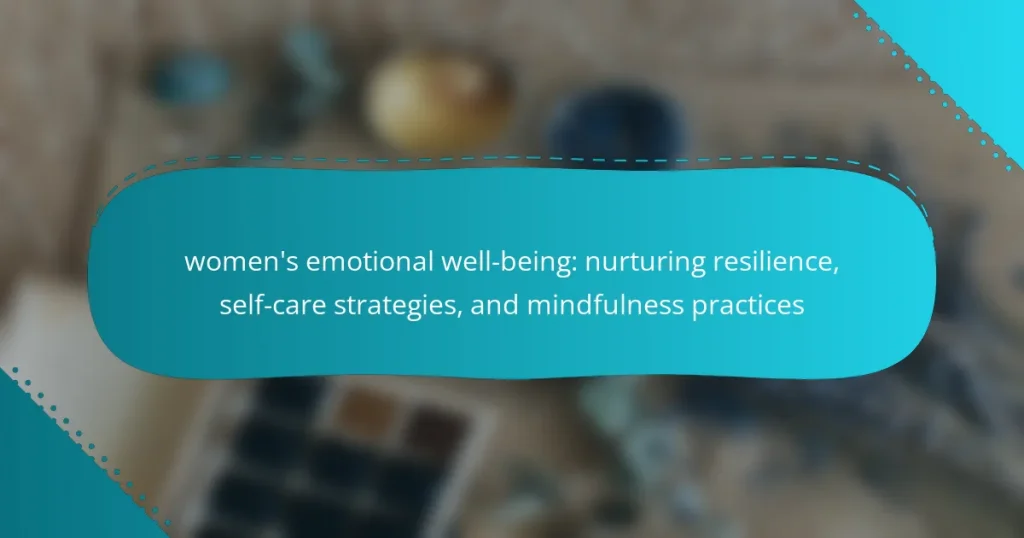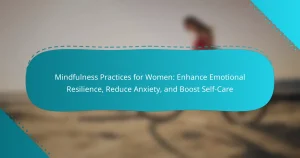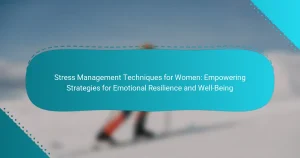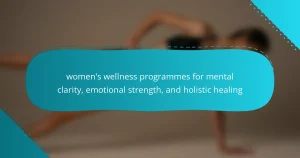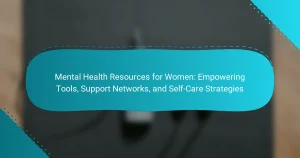Women’s emotional well-being is crucial for overall health and quality of life. This article explores nurturing resilience, effective self-care strategies, and mindfulness practices that enhance mental stability. It highlights the importance of physical activity, social support, and mindfulness techniques in managing stress and improving emotional regulation. By prioritising these elements, women can better navigate unique challenges and foster a healthier mindset.
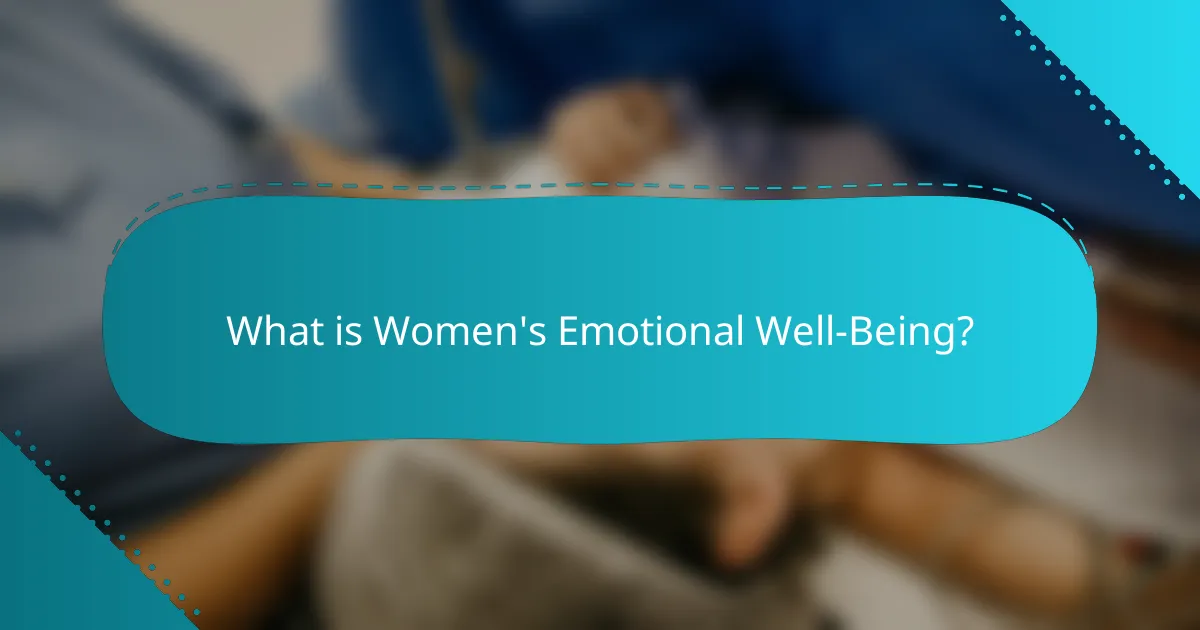
What is women’s emotional well-being?
Women’s emotional well-being encompasses resilience, self-care strategies, and mindfulness practices that foster mental health. Nurturing resilience involves developing coping mechanisms to handle stress effectively. Self-care strategies include regular physical activity, balanced nutrition, and adequate sleep, which contribute to emotional stability. Mindfulness practices, such as meditation and deep breathing, enhance self-awareness and emotional regulation. Research indicates that women who engage in these practices report higher satisfaction and lower anxiety levels. Prioritising women’s emotional well-being is essential for overall health and quality of life.
Why is emotional well-being crucial for women?
Emotional well-being is crucial for women as it enhances resilience and promotes overall health. Women often face unique stressors, making emotional health vital for coping effectively. Research indicates that strong emotional well-being leads to improved relationships and better decision-making. Self-care strategies, such as regular exercise and social support, significantly contribute to this well-being. Mindfulness practices, including meditation and journaling, further nurture emotional resilience, allowing women to manage stress and maintain balance in their lives.
What are the key components of emotional well-being?
Emotional well-being for women includes resilience, self-care strategies, and mindfulness practices. These components foster mental health and improve overall quality of life. Resilience helps women cope with stress and adversity, promoting a positive mindset. Self-care strategies, such as regular exercise and healthy eating, enhance physical and emotional health. Mindfulness practices, including meditation and deep breathing, reduce anxiety and improve focus. Together, these elements create a supportive framework for women’s emotional well-being.
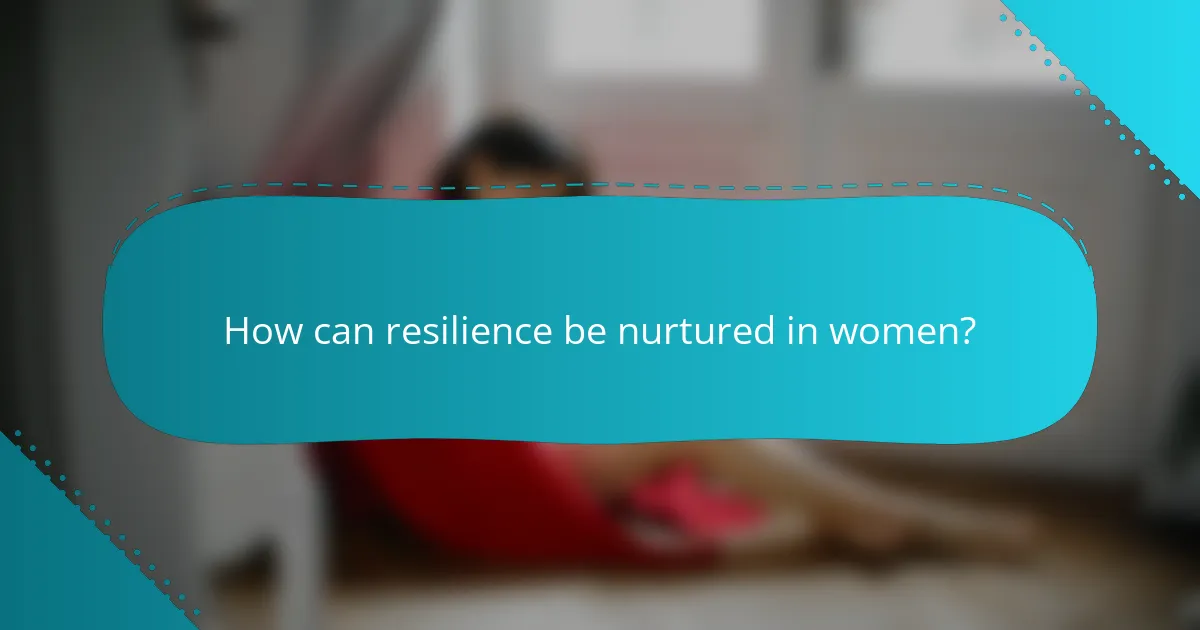
How can resilience be nurtured in women?
Resilience in women can be nurtured through self-care strategies and mindfulness practices. Engaging in regular physical activity enhances emotional strength, while establishing supportive social networks provides essential encouragement. Mindfulness techniques, such as meditation and deep breathing, promote emotional regulation and stress reduction. Additionally, setting personal goals fosters a sense of purpose and achievement, reinforcing resilience. Prioritising self-care routines can significantly improve overall well-being, allowing women to navigate challenges more effectively.
What strategies enhance resilience in daily life?
To enhance resilience in daily life, women can adopt self-care strategies and mindfulness practices. Prioritising emotional well-being involves regular physical activity, maintaining social connections, and engaging in mindfulness meditation. These practices foster a positive mindset and improve stress management. Research shows that women who participate in self-care activities experience lower anxiety levels and greater emotional stability. Additionally, journaling can serve as a unique attribute, allowing for reflection and deeper self-awareness.
How can supportive relationships contribute to resilience?
Supportive relationships significantly enhance women’s resilience by providing emotional strength and practical assistance. These connections foster a sense of belonging and security, which are crucial for coping with stress. Research indicates that women who maintain strong social ties experience lower levels of anxiety and depression, promoting overall emotional well-being. Additionally, supportive relationships encourage self-care practices and mindfulness, helping women navigate challenges more effectively. As a result, the combined benefits of social support and personal strategies contribute to a robust framework for resilience.
What role does self-compassion play in building resilience?
Self-compassion significantly enhances resilience by fostering emotional well-being in women. It allows individuals to embrace their imperfections and challenges without harsh self-criticism. Studies indicate that self-compassionate women exhibit greater emotional regulation, reducing stress and anxiety. This nurturing approach promotes a growth mindset, enabling women to learn from setbacks. As a result, self-compassion serves as a vital self-care strategy, enhancing mindfulness practices and overall resilience.
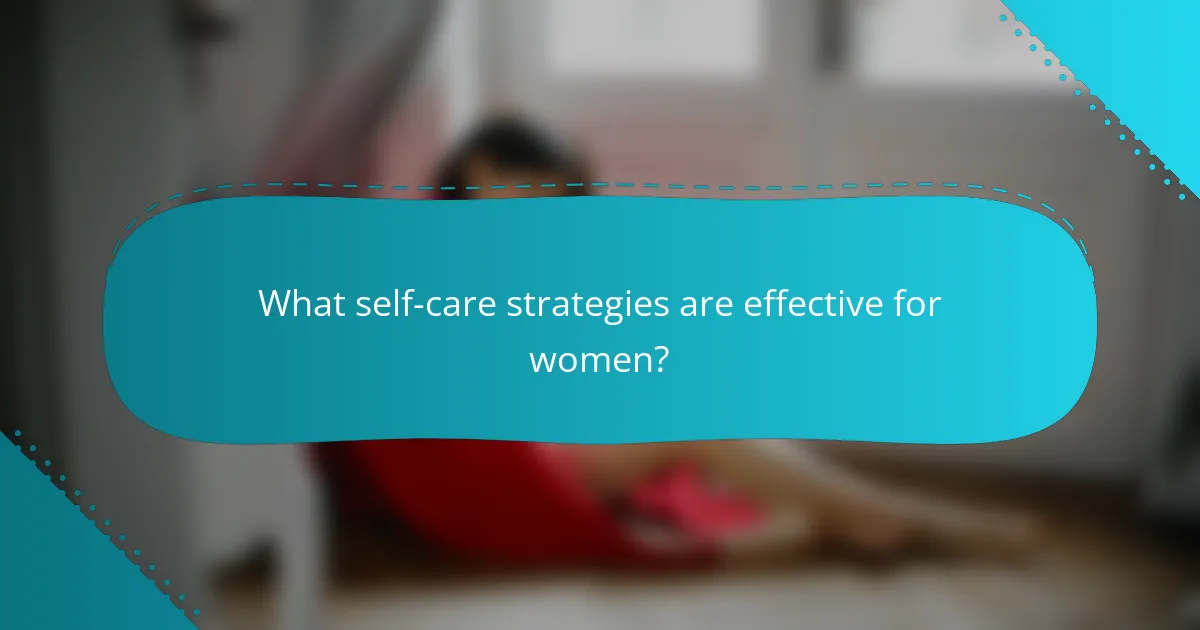
What self-care strategies are effective for women?
Effective self-care strategies for women include mindfulness practices, emotional resilience techniques, and physical wellness routines. Prioritising mental health through meditation enhances emotional regulation. Engaging in regular physical activity boosts mood and reduces stress. Establishing healthy boundaries fosters personal well-being. Connecting with supportive communities provides emotional support. Journaling facilitates self-reflection and clarity. Each strategy contributes uniquely to women’s emotional well-being, nurturing resilience and mindfulness.
How can self-care routines improve emotional health?
Self-care routines significantly enhance women’s emotional health by fostering resilience and mindfulness. Engaging in regular self-care practices helps reduce stress and anxiety, promoting a sense of well-being. Research indicates that women who prioritise self-care report higher levels of emotional stability and improved coping mechanisms. Incorporating mindfulness practices, such as meditation or yoga, further strengthens emotional resilience by encouraging present-moment awareness and reducing negative thought patterns.
What are the essential elements of a self-care plan?
A self-care plan for women’s emotional well-being includes essential elements like regular mindfulness practices, social support, and physical activity. These components foster resilience and emotional stability.
Mindfulness practices, such as meditation and deep breathing, enhance self-awareness and reduce stress. Regular physical activity boosts mood and energy levels, contributing to overall well-being. Social support, including relationships with friends and family, provides emotional resources and strengthens resilience.
Additionally, setting realistic goals and establishing routines can help women prioritise self-care. Journaling and reflective practices further promote emotional clarity and personal growth. By incorporating these elements, women can create a comprehensive self-care plan that nurtures their emotional health.
How does physical activity impact emotional well-being?
Physical activity significantly enhances women’s emotional well-being by reducing stress and improving mood. Regular exercise fosters resilience, boosts self-esteem, and promotes mindfulness. Engaging in physical activity releases endorphins, which are natural mood lifters. Studies indicate that women who exercise regularly report lower levels of anxiety and depression. Incorporating self-care strategies, such as yoga or walking, can further nurture emotional health.
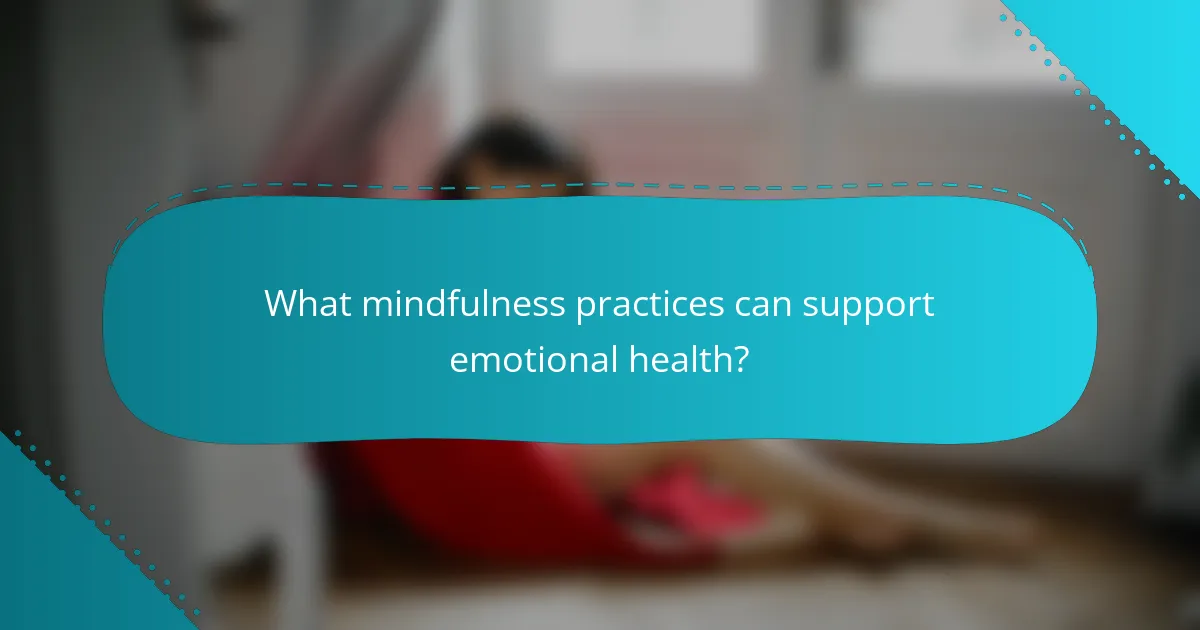
What mindfulness practices can support emotional health?
Mindfulness practices significantly enhance women’s emotional well-being by fostering resilience and self-care. Techniques such as meditation, deep breathing, and mindful journaling promote emotional regulation and stress reduction. Regular mindfulness practice can improve mood and increase self-awareness, leading to healthier coping strategies. Engaging in these practices for even a few minutes daily can yield substantial benefits for emotional health.
How can mindfulness meditation benefit women?
Mindfulness meditation significantly benefits women’s emotional well-being by enhancing resilience and promoting self-care. This practice fosters self-awareness, reduces stress, and improves emotional regulation. Research indicates that women who engage in mindfulness meditation experience lower levels of anxiety and depression, leading to improved mental health outcomes. Additionally, mindfulness encourages a positive self-image and fosters connections with others, which are crucial for emotional support. Embracing mindfulness as a self-care strategy empowers women to navigate life’s challenges with greater ease and confidence.
What are simple mindfulness exercises to start with?
Mindfulness exercises can enhance women’s emotional well-being by promoting resilience and self-care. Start with these simple practices:
1. **Breathing Awareness**: Focus on your breath for five minutes. Inhale deeply, hold, and exhale slowly.
2. **Body Scan**: Lie down and mentally scan your body from head to toe, noticing any tension or discomfort.
3. **Mindful Walking**: Take a short walk, paying attention to each step and the sensations in your feet.
4. **Gratitude Journaling**: Write down three things you are grateful for each day to foster positive emotions.
These exercises can be easily integrated into daily routines, supporting emotional health.
How does journaling contribute to emotional clarity?
Journaling enhances emotional clarity by providing a structured outlet for self-reflection. It allows women to articulate feelings, identify patterns, and process experiences, fostering resilience. Regular journaling can lead to improved self-awareness, which is essential for emotional well-being. Studies indicate that expressive writing reduces stress and promotes mental health, making it a valuable self-care strategy.
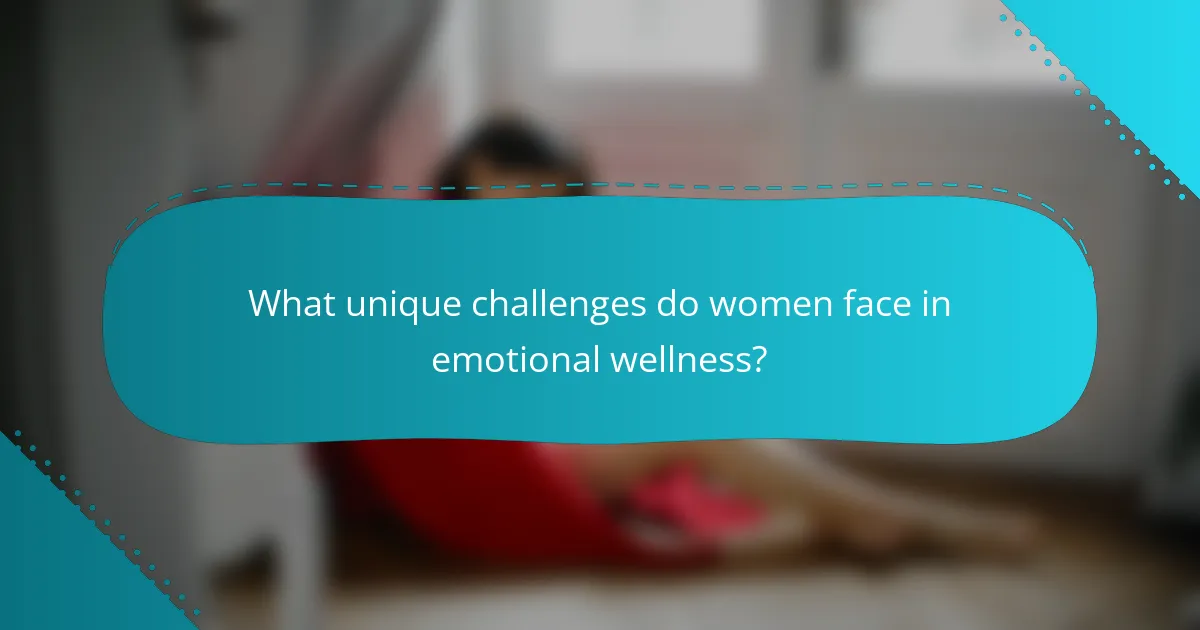
What unique challenges do women face in emotional wellness?
Women face unique challenges in emotional wellness, including societal pressures and gender-specific stressors. These factors can hinder their resilience and self-care practices. Women often juggle multiple roles, leading to emotional fatigue. Additionally, cultural expectations may discourage open discussions about mental health, creating barriers to seeking help. Mindfulness practices tailored to women’s experiences can enhance emotional well-being, fostering a supportive community. Prioritising self-care strategies can empower women to navigate these challenges effectively.
How do societal expectations impact women’s mental health?
Societal expectations significantly impact women’s mental health by creating pressures that can lead to anxiety and depression. These expectations often dictate standards for appearance, career success, and family roles. Women may feel compelled to conform, undermining their self-worth and emotional resilience. As a result, self-care strategies and mindfulness practices become essential for managing stress and fostering well-being. Engaging in these practices can help women reclaim their identity and strengthen their mental health against societal pressures.
What are common emotional health issues among women?
Women commonly experience emotional health issues such as anxiety, depression, and stress. These challenges often stem from societal pressures, life transitions, and hormonal changes. Understanding these factors is crucial for promoting resilience and effective self-care strategies. Research indicates that about 1 in 5 women will experience a mental health disorder at some point in their lives. Mindfulness practices, such as meditation and yoga, can significantly enhance emotional well-being by reducing stress and improving coping mechanisms. Prioritising self-care is essential for fostering emotional health among women.
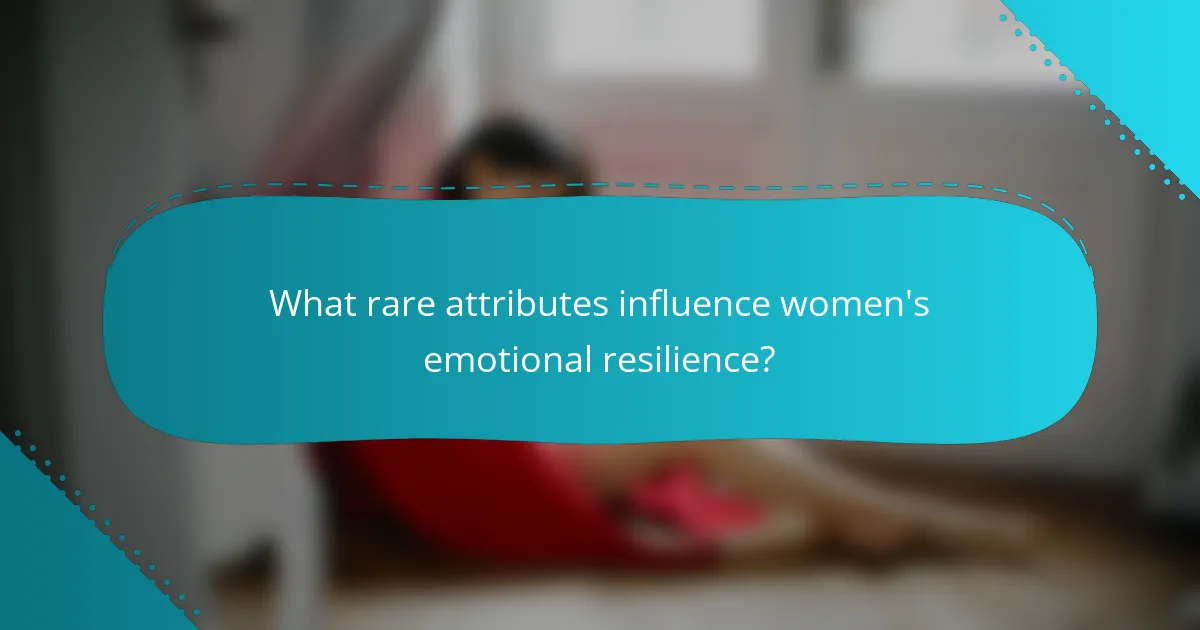
What rare attributes influence women’s emotional resilience?
Emotional resilience in women is influenced by unique attributes such as social support networks, adaptive coping strategies, and mindfulness practices. These elements foster stronger emotional responses to stress and adversity. Social support, for instance, provides a buffer against emotional challenges, while adaptive coping strategies enable effective problem-solving. Mindfulness practices enhance self-awareness and emotional regulation, contributing to overall well-being.
How does creativity enhance emotional expression?
Creativity enhances emotional expression by allowing women to articulate feelings through various forms of art and self-reflection. Engaging in creative activities fosters resilience, as it provides an outlet for processing emotions. Research shows that creative expression can reduce stress and anxiety, promoting overall emotional well-being. Additionally, mindfulness practices integrated with creativity, such as journaling or painting, deepen self-awareness and enhance emotional regulation.
What role does spirituality play in emotional well-being?
Spirituality plays a crucial role in enhancing women’s emotional well-being by fostering resilience and promoting self-care. Engaging in spiritual practices can lead to improved mental health, increased mindfulness, and a stronger sense of community. Research indicates that women who incorporate spirituality into their lives often experience lower levels of anxiety and depression. Spirituality encourages self-reflection, helping women develop coping strategies and a deeper understanding of their emotions. Additionally, it can provide a sense of purpose, which is essential for nurturing resilience in challenging times.
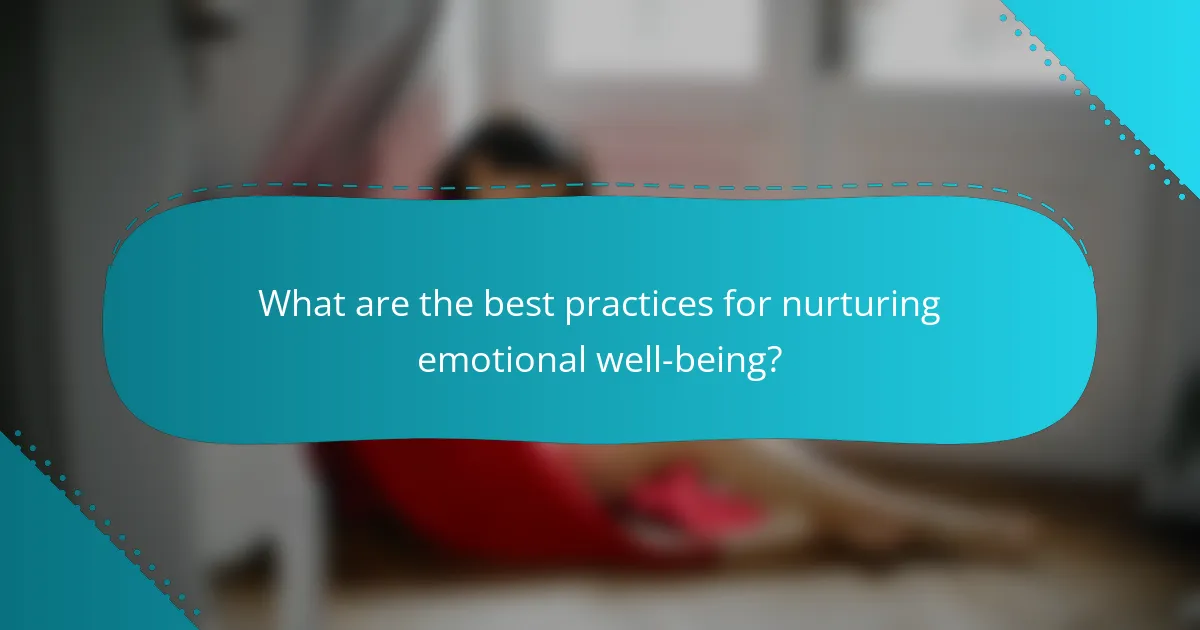
What are the best practices for nurturing emotional well-being?
To nurture emotional well-being, women should focus on resilience, self-care strategies, and mindfulness practices. Implementing daily self-care routines enhances emotional stability. Engaging in mindfulness exercises, such as meditation or deep breathing, reduces stress and fosters resilience. Establishing supportive social connections is also crucial for emotional health. Prioritising these practices leads to improved mental clarity and emotional balance.
What common mistakes should be avoided in self-care?
To enhance women’s emotional well-being, avoid common self-care mistakes. Neglecting personal needs, overcommitting to others, and ignoring emotional signals can hinder resilience. Prioritise self-awareness and set boundaries. Engage in mindfulness practices to stay present and connected. Regularly assess self-care routines to ensure they align with personal values and goals.
How can women create a supportive community for emotional health?
Women can create a supportive community for emotional health by fostering open communication, encouraging shared experiences, and promoting self-care practices. Establishing regular meet-ups allows for connection and support. Incorporating mindfulness practices, such as group meditation or yoga, enhances emotional resilience. Sharing resources, like books or workshops on mental health, can provide valuable insights. Lastly, recognising and celebrating individual achievements within the community strengthens bonds and boosts overall well-being.
What expert insights can guide women’s emotional wellness journey?
Expert insights for women’s emotional wellness emphasise resilience, self-care, and mindfulness. Resilience can be nurtured through positive self-talk and supportive relationships. Self-care strategies include regular physical activity, maintaining a balanced diet, and engaging in hobbies. Mindfulness practices, such as meditation and deep breathing, enhance emotional regulation. Research shows that women who practice mindfulness report lower stress levels and improved emotional health. Implementing these insights fosters a holistic approach to emotional well-being.
